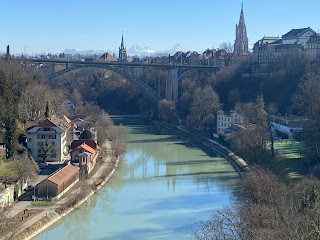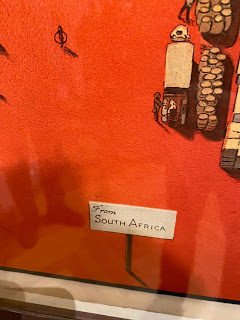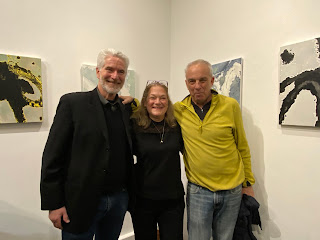Veteran of four wars, four enlistments, four branches: Air Force, Army, Army Reserve, Army National Guard. I am both an AF (Air Force) veteran and as Veteran AF (As Fuck)
Saturday, February 18, 2023
Cosmic Radiation Research in the High Alps and Bedford, Massachusetts
Thursday, February 16, 2023
Helpful Guy in a Berne, Switzerland, Laundromat
Today in Berne, Switzerland, not too far from the river in this photo, I went to a small laundromat. I got Swiss Francs on the way and bought a sandwich and coffee so I would have change and small bills. But as is often the case with laundromats, the money requirements are very specific.
Outside waiting for his laundry to dry was a guy named Thomas who helped me with the whole process--which coins I needed and where to get them. The washer needed five one-franc coins, the soap dispenser and dryers would take coins from 10 centimes up to five francs. Thomas took me over to the bar next door where they gave change for the laundry. Then he pulled his clothes from the dryer and went home. COVID is far enough from people's minds that we shook hands as he left.
Since I travel with just a backpack, I am in weekly need of a laundromat on a long trip. Last week I used a laundromat in Paris near the Pantheon, not my favorite one, it was closed for remodeling.
My favorite laundromat in the world is in Jerusalem where I met an Israeli tank commander who fell from a helicopter and lived to tell about it.
Last year, at a rural boat dock in Denmark, I used the laundromat and met a retired electronics technician who had traveled the world for Siemens Corporation. He nearly died during the civil war in Libya, but hates Las Vegas more than any place on earth. I also met three of four American sisters traveling together in Paris in the renewed travel in 2022.
Just as I was leaving the laundromat today, as guy with a cigarette scratchy voice asked me a question in what I thought was German. I said I only speak English. He said, much more clearly, "I am speaking English." I laughed and passed along the information from Thomas: 1 franc coins only for the washer, any coins for the soap and the dryer. He thanked me and began pulling off several layers of clothes and putting them in the washer.
Tuesday, February 14, 2023
Cold War Manchester Tour from Ian Sanders, Host of the Cold War Conversations History Podcast
I visited Manchester UK recently to meet Ian Sanders in person, after knowing him for several years as the creator and host of the Cold War Conversations History Podcast. He started the podcast in 2018 as a way to preserve the stories of the people who lived through the Cold War, served in the military in the Cold War, and had stories about their part in this long simmering worldwide conflict.
The podcast is now in its 277th episode, about "The Most Damaging Female Spy in Us History." The podcast has had more than two million downloads in the past half decade.
The tour began with the picture above. Many buildings in Manchester had fire watchers during World War II. In December 1940 the Nazis fire bombed Manchester to devastating effect. More than 700 people were killed in two terrible nights of fire bombing.
Ian showed me a memorial to those who lost their lives. A metal tree with all of the names inscribed in the trunk.

We also saw a funny 19th Century "Union Jack" view of the world:
Almost four years ago, before the pandemic, Ian interviewed me for the podcast. In episodes 38 and 41 we talked about US Army tank training and serving on the Cold War border in Fulda, West Germany. the podcast is audio, but the recording of the second interview about Fulda has more than 7,000 downloads on YouTube.
As we walked toward the train station at the end of the visit, Ian showed me the entrance of a huge underground telecommunications facility built under Manchester during the Cold War. It is still in operation today.
Friday, February 10, 2023
Voraigh Sisters--A Paris Boutique of Traditional Clothing
VORAIGH Sisters from Ancient Lands. They describe the store:
Founded in 2008 by sisters and violinists Olivia & Vivien and their mother Bruna, who taught them a passion for historical and traditional arts. Our workshop is based in a small village not far from Paris, on the edge of the magical forest of Fontainebleau.
Voriagh (synonym of Varangian, in Old Norse: Væringjar; Greek: Βάραγγοι, Βαριάγοι) is the name used by the Byzantine Empire and the Eastern Slavs for the Vikings, (víkingar, from Old Norse) traded from their Northern European homelands across central, eastern and western Europe.
We create in deep connection with nature and ancient lands across Europe, influenced by folklore and ancient crafts.
Following strict guidelines in terms of sustainability for material and craft, our small structure relies on two skilled families: one in France and one in India, mastering an infinite panel of techniques, completing each other by offering high expertise and traditional embroideries for several generations. In addition to this close relation, we provide transparency and certifications by Oekotex and the BSCI for both structures.
Thursday, February 9, 2023
Meeting High School Classmates at a Paris Gallery Opening: Paul Campbell is a Featured Artist
I visited the gallery for the opening and had a lovely time talking to Susan and Paul. They had only been to one of the class reunions so we had not seen each other since Stoneham in 1971.
Paul and Susan live in Brooklyn and Cape Cod, so we are going to get together in the next couple of months before they go off to live in the most well-known beach community in New England.
Saturday, February 4, 2023
Tanks Attack, They are Designed for Offense
From their first use as land battleships in World War I, tanks are an attack weapon. They can be used in defense, but as my last post pointed out, the German force attacking France in 1940 was outnumbered and outgunned by the British and French tanks in defense. And France surrendered in five weeks.
Speculation is rampant on line and in the media that the Russians will attack in the spring before Ukraine can take delivery of the NATO tanks promised to them recently. They could be right, but nothing the Russians have done in the past month or the past year gives me much worry that the Russians will put together an overwhelming attack against Ukraine.
The military generic term for armor is MPF--Mobile Protected Firepower. This includes not only main battle tanks but armored personnel carriers like the Bradley Fighting Vehicle which the US is sending to Ukraine already. The Bradley is fast, is armed with a 25mm rapid-fire cannon and can carry an infantry squad into battle.
With a large number of MPFs and trained crews supported with fuel and ammo, the Ukrainian army can punch through the Russian lines and destroy their command posts and supply lines.
German Leopard 2 tanks are faster, more reliable and have vastly better gun sights and gun controls than the Russian tanks opposite them. More importantly, Ukraine has shown in other battles that they will know how to use armor. They will mass their tanks at a weak point in the Russian defense and break through.
I bought the t-shirt I am wearing (above) and the Deutsche Panzer Museum. It says, "Tanks are not Neutral." They are offensive weapons. I look forward to wearing this shirt while watching or listening to news about Ukrainian victories in the coming year.
A German soldier I was talking to in the museum said the shirt is also ironic. The German Army, like many armies and government organization, is trying to use more gender neutral language. German is a very gendered language and Panzer is a male-gendered word. The shirt is also a protest of making the word Panzer gender neutral.
Tuesday, January 31, 2023
Tactics, Not Just Numbers, Win Tank Battles
Suresnes American Cemetery and Memorial
Perched on the slopes of Mont Valérien just west of Paris , the Suresnes American Cemetery is the only American military cemetery from t...

-
Tasks, Conditions and Standards is how we learn to do everything in the Army. If you are assigned to be the machine gunner in a rifle squad...
-
The Remains of the Day by Kazuo Ishiguro Kazuo Ishiguro’s The Remains of the Day is, on the surface, a beautifully restrained novel about...
-
On 10 November 2003 the crew of Chinook helicopter Yankee 2-6 made this landing on a cliff in Afghanistan. Artist Larry Selman i...








































